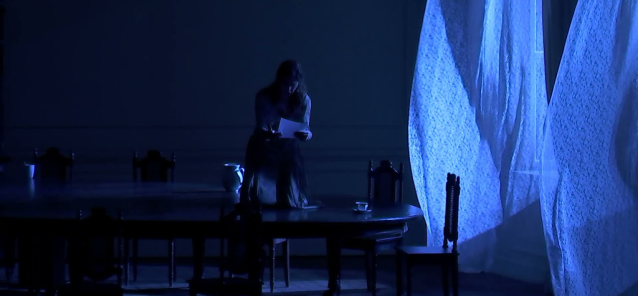With his »lyrical scenes in three acts«, premiered in 1879 by a student ensemble at the Moscow Maly (di Kleinen) Theater, Tchaikovsky departed from the »grand style« that was largely binding for the opera of his time: »I don’t need tsars, tsarsesses, popular uprisings, battles, marches ... I am looking for an intimate but powerful drama based on the conflicts I have experienced or seen myself that can touch me to the core.«
The composer found such an intimate drama in Alexander Pushkin's verse novel Eugen Onegin (1833), which has gone down in cultural history as the »encyclopedia of Russian life«. In it, Pushkin masterfully describes the life of contemporary society in all its diversity. With his eponymous hero, he created what later came to be known as »superfluous people«, a recurring archetype in Russian literature.
The fame of the original stood in the way of the reception of the opera for some time – especially in Russia itself. Despite the immediate appreciation of its music, it was perceived as a corruption of a cultural monument of national literature. Among writers, rejection ranged from Ivan Turgenev's horrified letter to Tolstoy from the year of its premiere ("Imagine: Pushkin's verses about the characters who put them in their mouths!") to Vladimir Nabokov, who wrote in the 1964 commentaries translation of Pushkin's novel never tires of castigating Tchaikovsky's »slapdash opera« (»opera pancakes«). The success of this present – next to the Boris Godunov– probably the most famous Russian opera was initially delayed as a result. Today we are able to do justice to their aesthetic and dramaturgical autonomy, which is not limited to their certainly extraordinary musical beauties.
The starting point for Tchaikovsky's adaptation was the famous letter scene of Tatjana Lárina, a landowner's daughter who escapes from the narrow circumstances of her life into literary fantasy worlds. In her identification with the heroines of the epistolary novels, she throws all the rules of the genre upside down by opening the dialogue as a woman and declaring her love for a man. But the dandy Onegin, who is as agile as he is incapable of commitment, who has been brought from the capital to the estate next door to the Lárins by an inheritance matter, coolly rejects her love: in response to her passionate self-revelation, he gives her a curtain sermon. On Tatjana's name day, he vents his bad mood by telling his only friend and confidant, provokes the young poet Lenski and then willy-nilly shoots him in a duel. After that he travels aimlessly through the world. Three years later he met Tatjana again as the admired hostess of a St. Petersburg salon at the side of a highly honored general. He realizes that he missed the happiness of his life. But now it's the still hurt, still loving Tatjana who rejects him.
The epic template led to very special solutions that were not readily available in the operatic tradition. This can already be read from the genre designation »Lyric Scenes in Three Acts« chosen by the composer. The loosely assembled narrative means that it is hardly possible to distinguish between the main and secondary characters. Even if the musical parts of the roles are weighted differently, the piece's attention is also focused on Tatjana's fun-loving sister Olga, her fiancé Lenski and her mother Lárina, it lends an ear to the bitter life story of Tatjana's old nurse and also an episodic character such as the fatal duel Second Saretzki are accurately portrayed; a single appearance in the last act is enough to give Tatyana's husband Gremin impressive stature.
The director and set designer Dmitri Tcherniakov has created a hermetic neoclassical dining room in which a timeless inner event takes place. The central design element is a long table. As a place of shared festive enjoyment of life, it makes the irrevocable alienation of the characters all the more palpable. We experience how two characters are thrown off track by their love ailments: a practically hospitalized Tatyana, who fell silent even before Onegin rejected him, and the poet Lenski, who lost his childhood love Olga, who inwardly turned away from him and also in the attracted by his attractive companion Onegin, is driven into a deadly duel with his once-admired friend.











